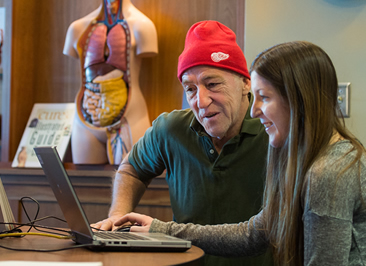Quitting Matters
A patient prepares for surgery, healthy changes and the future

Photo Credit: Edda Pacifico
An Early Start
At 17, Doug Klein's parents agreed to let him join the Air Force. Jobs were scarce in the '70s and Klein thought the discipline and skills would jumpstart a bright future. Everything about his military experience was positive except that he started smoking, a habit that stuck.
"The accessibility of cigarettes makes it pretty easy," Klein says. "It's like anything. My body craves it. I started when I was younger, went down that path and you live with it."
Klein completed his service in 1979, married and moved back to the Midwest. He found a job with the Wayne County sheriff's office and, 23 years later, was starting to think about retirement.
While preparing for his daughter's wedding last summer, he noticed blood in his urine. He received the diagnosis of bladder cancer. In addition to major decisions about treatment and surgery, Klein had another challenge: setting a realistic quit date and sticking to it.
His urologist, Cheryl T. Lee, M.D., noted his desire to quit smoking. "Smoking cessation in bladder cancer patients is critical since cumulative smoking exposure among both current and former smokers has been associated with recurrence, progression of the disease and overall survival," she says.
Helping Patients Across Michigan
According to Alon Weizer, M.D., associate professor of urology and medical director of the U-M Rogel Cancer Center, 50 percent of bladder cancer cases are attributed to smoking.
The disease, when caught early, is highly treatable but also likely to recur. Continuing to smoke is a major risk factor for recurrence, as the harmful chemicals can be excreted in a person's urine, causing damage to the lining of the bladder. There is compelling evidence from several cancer types that people who quit smoking have better outcomes with cancer treatment.
1-800-784-8669
The Quit Line provides cessation services to Michigan residents that want to quit using tobacco. The Quit Line offers a personal health coach and participant toolkits to help tobacco users gain confidence and motivation they need to quit for good. Cancer patients will also receive FREE nicotine replacement therapy.
Weizer and Lee believe oncologists can play a vital role in helping patients stop smoking simply through education and offering resources. They are participating in a new stopsmoking program created by the Michigan Oncology Quality Consortium to improve cancer care across Michigan. The group wants every patient who uses tobacco to be offered scientifically sound options to quit.
The program, Michigan Tobacco Quitline Services, is free and confidential. Well-trained professionals provide callers with support, local resources and counseling seven days a week from 7 a.m. – 1 a.m.
Making a Plan
For many patients, including Klein, quitting smoking isn't as simple as wanting to. He plans to quit completely during his hospital stay and recovery after surgery.
"Right or wrong, it's the one time I can really wrap my head around," Klein says. "I know I can do more good for my body if I quit. I’ll be able to get over all the cravings and should be stable when I go home."
Klein, whose children are grown adults, has big plans for the future: not only is he engaged to be married, he and his fiancée are parents to two rescue pit bulls.
"Importantly, over time, smoking cessation can reduce the risk of disease recurrence by 30-40 percent and the risk of bladder cancer progression by up to 50-60 percent," says Lee.
Continue reading the Spring, 2015 issue of Thrive.
